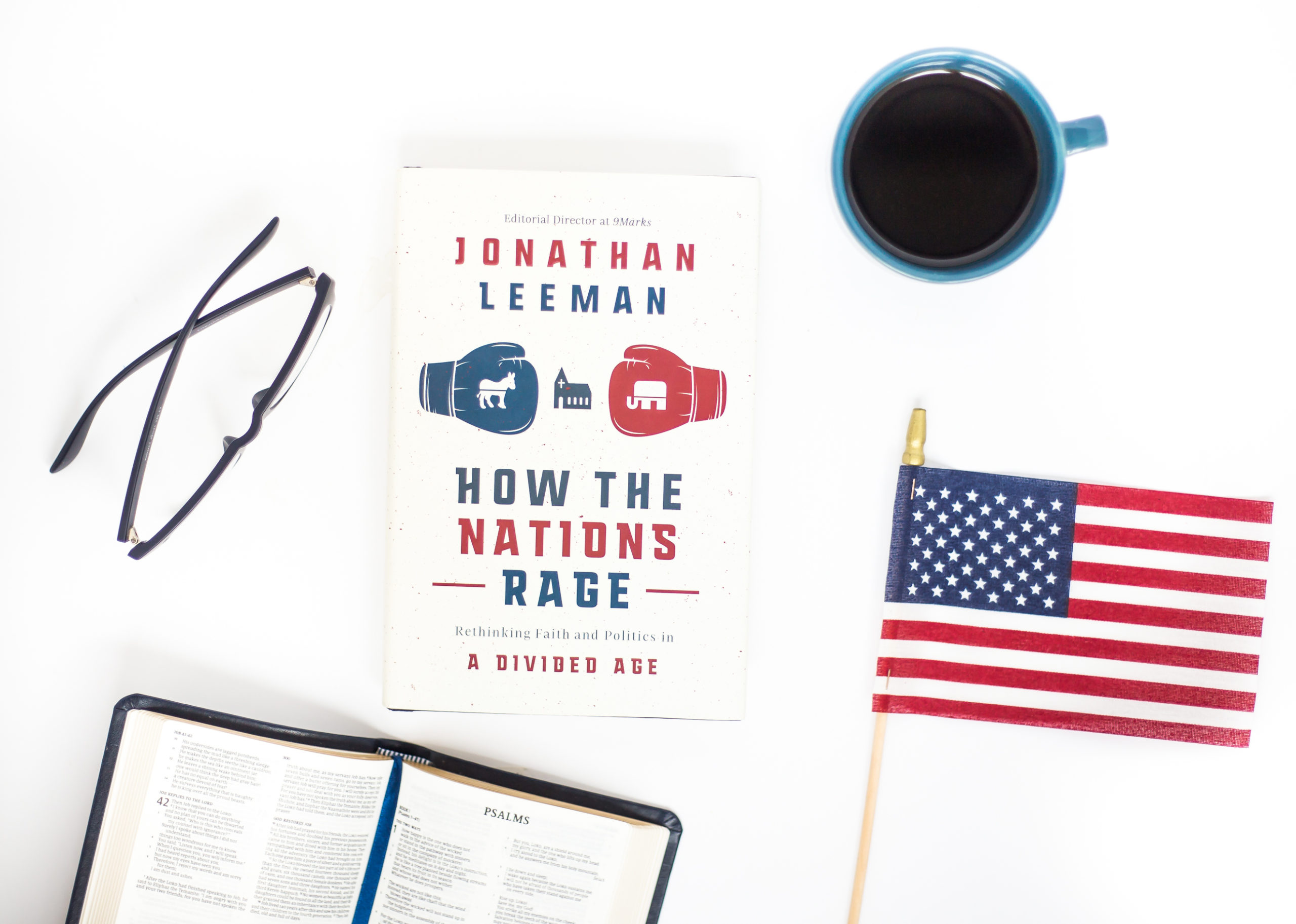This post contains affiliate links
The conversation about faith and politics is often heated amongst Christians. As a pastor and resident of Washington D.C., author Jonathan Leeman is no stranger to this fact. His book, How the Nations Rage, is a primer of sorts to help Christians know how to engage in these conversations in a manner that honors God and is loving toward other individuals regardless of whether or not one agrees with their political ideologies or alliances.
The book derives its title from Psalm 2:1 which states, “Why do the nations rage and the peoples plot in vain?” In the early pages of his book, Leeman observed, “It’s my sense that one of Satan’s greatest victories in contemporary America has been to divide majority and minority Christians along partisan lines,” (pg. 9). He wrote that, “. . . confusing our judgments with God’s turns our judgments into idols, which in turn divides the church and leads to injustices inside and outside the church,” (pg. 10). On the following page, he expressed, “. . . I am concerned that sometimes we let principles of Americanism determine the way we read Scripture, rather than letting Scripture determine how we evaluate principles of Americanism,” (pg. 11). I found these thoughts to be helpful and convicting. He encourages readers, “. . . as Christians who prize God’s wisdom above that of men and women. . . strive to stop from time to time and say, ‘Wait a second? Is this biblical?’ and be willing to throw everything off the boat if necessary,” (pg. 10). Asking whether or not our political ideals or party allegiances are biblical is simple and very helpful. Upon Leeman’s suggestion of asking this question, I have found that I am continually asking it of myself.
There are many aspects of Leeman’s book that I appreciate. I greatly value his commitment to viewing politics through the lens of Scripture. I also really appreciate that rather than contributing to the division Christians already experience when it comes to politics, Leeman urges readers to allow Scripture to shape their convictions rather than seeking to enforce his own upon them. It was really fascinating to read Leeman’s discourse of how politics begins within the context of the local church. He addressed this on page 14 when he wrote, “The local church should be a model political community for the world. It’s the most political of assemblies since it represents the One with final judgment over presidents and prime ministers.”
On page 133 he said, “Our political instincts should develop by living inside the loving and difficult relationships that comprise a church.” On the same page, he included a brief list of thoughts to help readers know what this might look like. He wrote:
- “Welfare isn’t just a policy area; it’s a sister in Christ who accepts help, but only on her terms. What are you going to do?
- Taxes aren’t just a public matter; it’s the financially strapped member of the body sitting at your kitchen table. How do you respond?
- Racism isn’t just something we witness on the news; it lurks in our churches and in our hearts. Will you confess?
- Immigration isn’t just a topic for politicians; it’s someone trying to join your church. Will you open the door?”
I found these questions to be quite convicting and I’ve read them many times. These questions are a great place to begin when it comes to evaluating how one allows their views of politics to be shaped especially if they claim to be a Christ follower.
I’m thankful for the wisdom Leeman offers on page 152 regarding the role of conviction in the political decisions Christians make. He began by asking, “Will you maintain Christian unity?” and answered with, “I’m simply pleading for you to make space for other Christians to disagree with you, to leave these matters in the realm of Christian freedom, to preach the Bible, and to lower the emotional temperature on these kinds of conversations.”
On page 173 Leeman included twelve lessons for Christians on how to engage politically and live as ambassadors, not as culture warriors. Leeman introduced the section with the idea that, “. . . political success for a Christian equals faithfulness, not results. God calls us to efforts, not outcomes. When a Christian confronts a nation and leaders, whether in a Senate bill or in a gospel tract, opposition will come. But that does not change our task: Christians must speak faithfully as prophets and priests on behalf of Christ.”
He spoke more of this on page 198 when he said, “We make sincere efforts to persuade others to our points of view. But we do not fear losing, because we know that our God has already won. Every political result that plays out in this life is under God’s sovereign control and is being worked out for the good of those who love him and who are called according to his purpose (Rom. 8:28). This knowledge liberates us to be the kind of happy ambassadors who are always faithful, and sometimes (with God’s help), effective.”
If you are a Christian who is also a republic, democrat, somewhere in between, or politically homeless, I know you’ll enjoy this book and greatly benefit from it.
I really enjoyed reading How the Nations Rage and am pleased to give it my highest recommendation.






